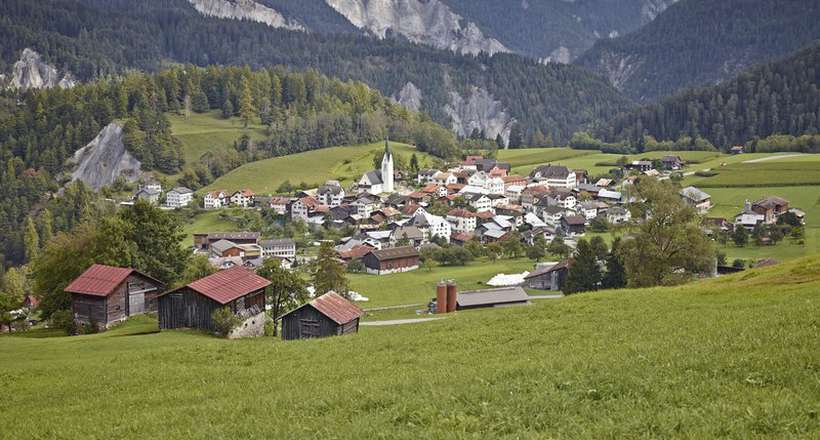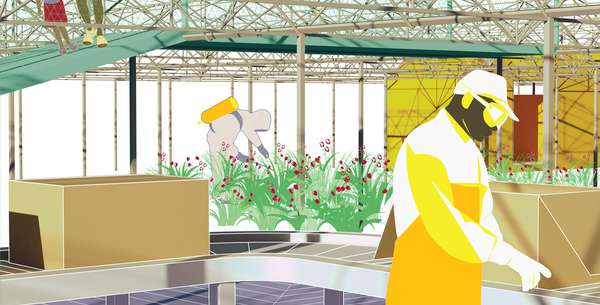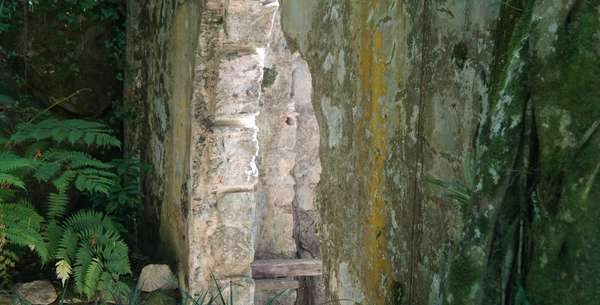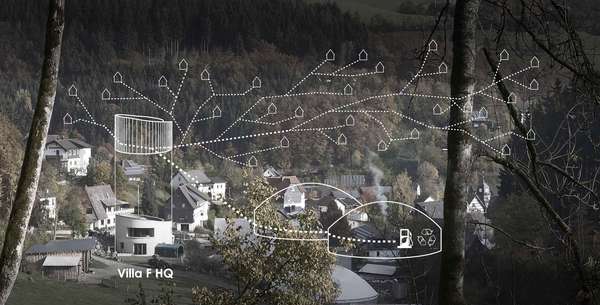CountryLife. Recent strategies for tomorrows rural living

© 2020, für die Stiftung Ferien im Baudenkmal Gataric Fotografie, Mountain Village Valendas, Switzerland
The increasing migration from rural areas to the cities, which results in empty buildings and demographic change in village structures, is a global phenomenon not restricted to Austria or Styria – although the causes behind the development of course differ. The result is a diminishing infrastructure (doctors, schools, shops, public transport), which only speeds up the downward spiral. What possibilities and approaches can be used to slow down or even reverse this negative development? The exhibition shows selected examples of revitalisation in villages and rural municipalities developed with the support of architects, politicians and planners, and reveals different strategies used to successfully reactivate rural spaces.
The term “rural space” refers to a highly complex region with very different manifestations and usage structures. The OECD (Organisation for Economic Co-operation and Development) defines a community as rural if its population density is below 150 inhabitants per km². According to this definition, ca. 93% of the globe is made up of rural areas. These regions encompass small-scale settlements and residential areas, industrial and transport facilities, green spaces and recreation areas, tourist destinations, food production and agriculture as well as ecological compensation areas.
Fuelled by the debates on climate change as well as experiences shaped by the connection between urban and rural areas during the COVID-19 pandemic, the importance of the countryside in providing a counterpart to the cities has been highlighted – in terms of ensuring regional supplies, for recreation and as an ecological compensation area as well as an economic space for production and tourism.
With contributions from international and regional stakeholders, this exhibition along with the accompanying publication and discussion series aim to discover new, sustainable ideas and ways of living together in the countryside. What could a contemporary, attractive future in such regions look like? How can the existence, development and redirection of villages and communities be sustainably promoted? How can new builds and conversions help to revitalise villages and municipalities? What social and regional specifics need to be taken into account for future-proof development? What must a location or village provide to also fulfil the wishes and requirements of a younger generation?
This atmospheric designed exhibition installation opens with Monika Müller/Addendum’s short documentary film Landflucht (rural exodus) set in the Austrian region of Burgenland. Visitors can then view practical examples from rural areas implemented by experienced professionals. These successful international projects for rural rejuvenation are given additional context by innovative approaches and visions from the network of the Future Architecture Platform. The projects range from documentation and interactions with the local population to integrative new concepts for energy generation and specific architectural interventions. All examples have in common a close collaboration with the region’s residents. In combination, the selected projects provide an overview of possible approaches to reactivating rural spaces and give visitors a new perspective on life in the country with ideas that encourage thinking ahead, reflection and participation.
The following projects can be seen at the exhibition:
3RW arkitekter, NO – Building in extreme landscapes in Western Norway
CIVIS, USA – A digital communication tool for the rural population
Christoph Hesse Architects, GER – A biogas plant gives a village a new identity in North RhineWestphalia, Germany
DnA_Design and Architecture Beijing Office, CN – Location-specific projects for the rural region of Songyang in China
Office of Human Resources, USA – Reorganising regional vegetable production in Africa
MattonOffice, NL/GER – Reactivating a linear settlement in Mecklenburg-Vorpommern, Germany.
Jason Rhys Parry, USA – The reappropriation of abandoned villages by nature. Ritter Schumacher Architects, CH – A process of development in the municipality of Churwalden, Switzerland
Stiftung Ferien im Baudenkmal, CH – Saving endangered heritage buildings through tourism
TiriLab, GR – Observations and suggestions for developing the coastal region of Thesprotia in the north-west of Greece
EXHIBITION
Press Tour: 16 September 2020, 11 am. Registration is required at: presse@hda-graz.at
Exhibition Opening: Open House I Guided Tours: 16 September 2020. Registration is required.
Exhibition: 17 September – 17 January 2021
Venue: HDA – Haus der Architektur, Mariahilferstraße 2, 8020 Graz Opening Hours: Tue–Sun, 10–18 Uhr
PROGRAMME
Film evening On 22nd September, the film Rettet das Dorf (Save the village) by Teresa Distelberger will be shown on the Murinsel. Registration is required.
Discussion series Due to current COVID-19 regulations, the accompanying symposium in cooperation with Province of Styria, department A16 – Verkehr und Landeshochbau will take place as an online discussion series in September and October. For further information please see our website www.hda-graz.at.
An exhibition catalogue is available.





